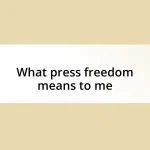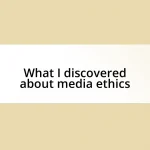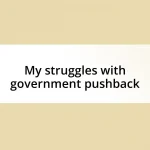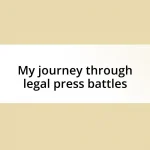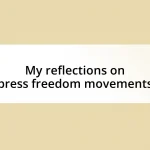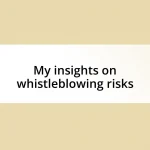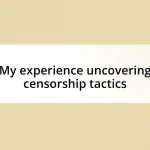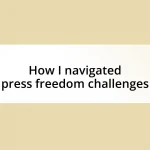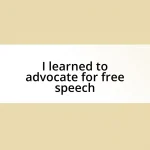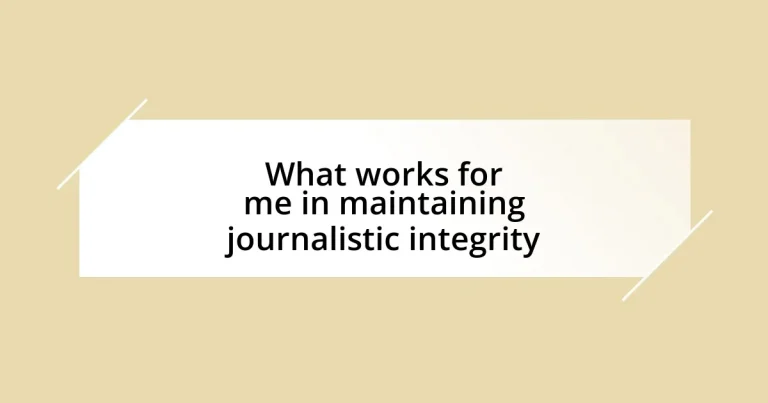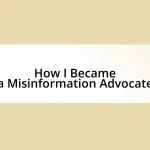Key takeaways:
- Journalistic integrity hinges on trust, transparency, and accountability, requiring a commitment to truth and ethical considerations.
- Defining personal values like honesty and empathy enhances relationships with sources and strengthens the authenticity of reporting.
- Establishing a robust fact-checking routine is essential to maintain credibility, requiring diligence in verifying information across multiple sources.
- Navigating conflicts of interest with transparency and consultation fosters trust and preserves journalistic integrity while managing personal relationships.
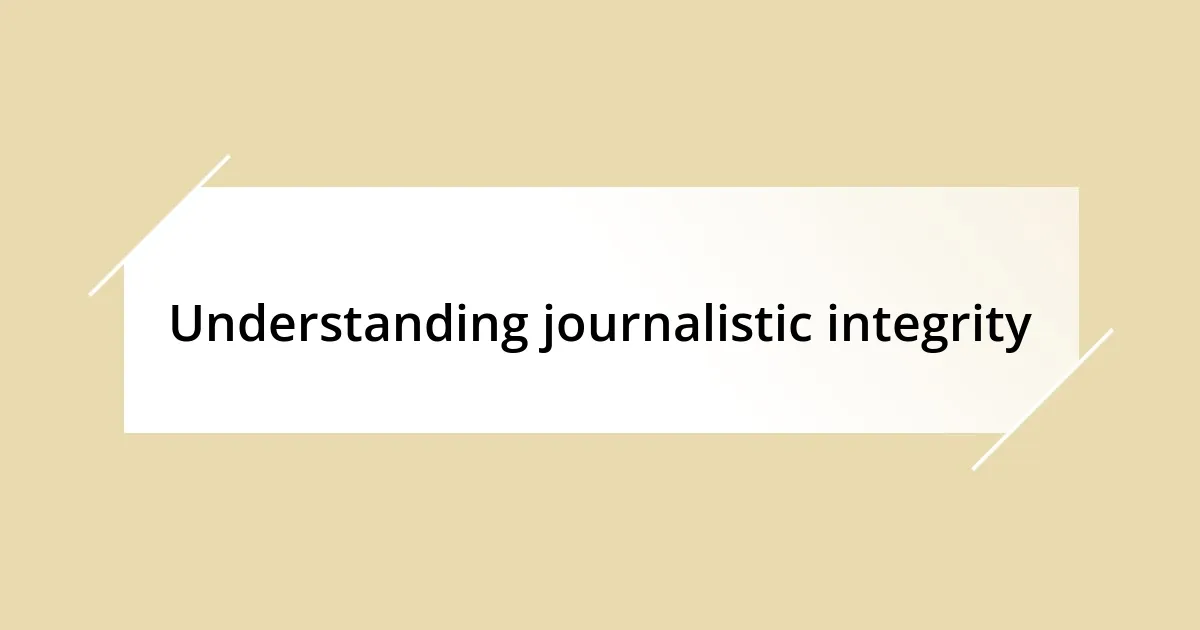
Understanding journalistic integrity
Journalistic integrity, at its core, is about trust. I remember a time when I had to make a tough call on whether to publish a story that could potentially harm someone’s reputation. It was a moment that made me question: How do we balance the public’s right to know with ethical considerations? That’s when I realized integrity isn’t just a policy; it’s a commitment to asking the right questions and seeking the truth, even when it’s uncomfortable.
It’s also about transparency. I’ve learned that being open with my audience about my sources and motivations builds deeper connections. For example, when I disclosed potential conflicts of interest in a piece I wrote, the feedback was overwhelmingly positive. Readers appreciated my honesty, reinforcing my belief that integrity can foster a sense of community and shared values in journalism.
Lastly, accountability plays a vital role in journalistic integrity. I recall a situation where I had misquoted a source, and upon realizing this, I promptly issued a correction. Mistakes happen, but how we respond makes all the difference. When we own our errors, it signals to our audience that we take our role seriously, which can ultimately enhance our credibility. Isn’t that what we all want as journalists—to build a legacy of trust that resonates with our community?
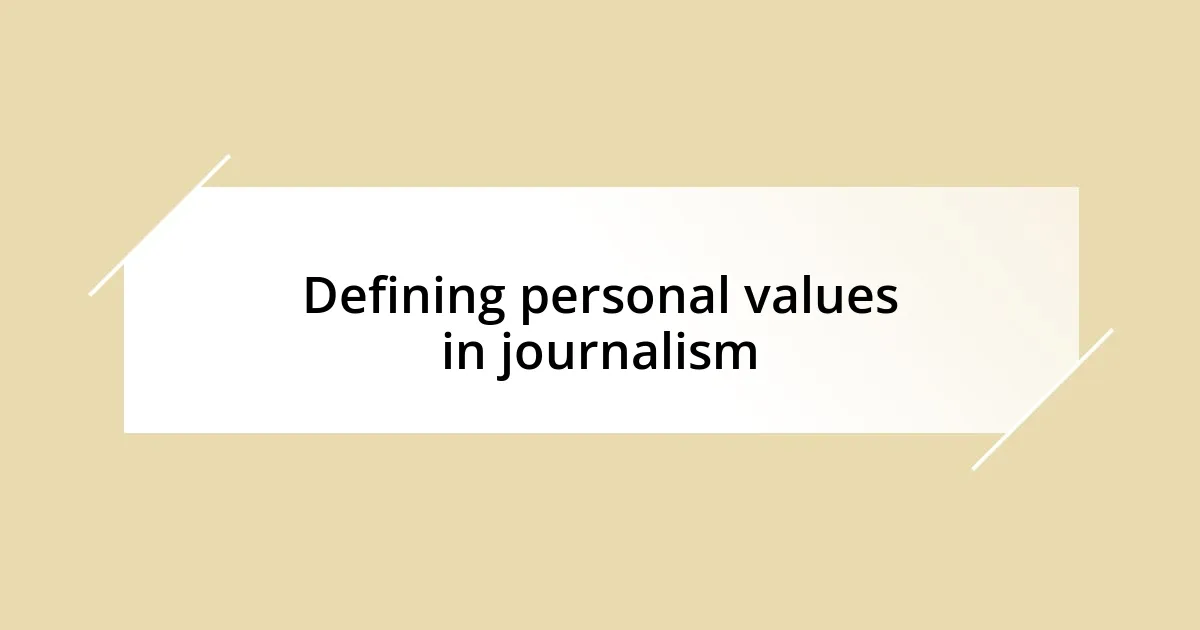
Defining personal values in journalism
Defining personal values in journalism is a journey that shapes how we approach our work. I’ve found that identifying my core beliefs has not only guided my reporting but has also influenced how my audience perceives my work. For instance, I prioritize honesty, which means I often turn down sensational stories that lack substantial evidence. There’s something deeply satisfying about knowing that my decisions are aligned with what I value most.
Values like empathy and respect inform the way I engage with sources and subjects. I remember interviewing a family affected by a tragic event; I chose to focus on their emotions rather than sensationalize the incident. This approach not only deepened the story but also created trust between me and the subjects. It’s moments like these that remind me that journalism should serve humanity, not just inform it.
Additionally, my commitment to social responsibility drives me to highlight underrepresented voices in my work. I actively seek stories that challenge the status quo and shed light on social injustices. When I share these narratives, I can feel the impact they have on both the subjects and the audience. In a world flooded with information, I strive to ensure that my values resonate through the stories I tell, creating a meaningful connection with readers.
| Value | Significance |
|---|---|
| Honesty | Guides decision-making; fosters trust with audience |
| Empathy | Enhances engagement with sources; promotes respectful storytelling |
| Social Responsibility | Highlights underrepresented voices; drives social change |
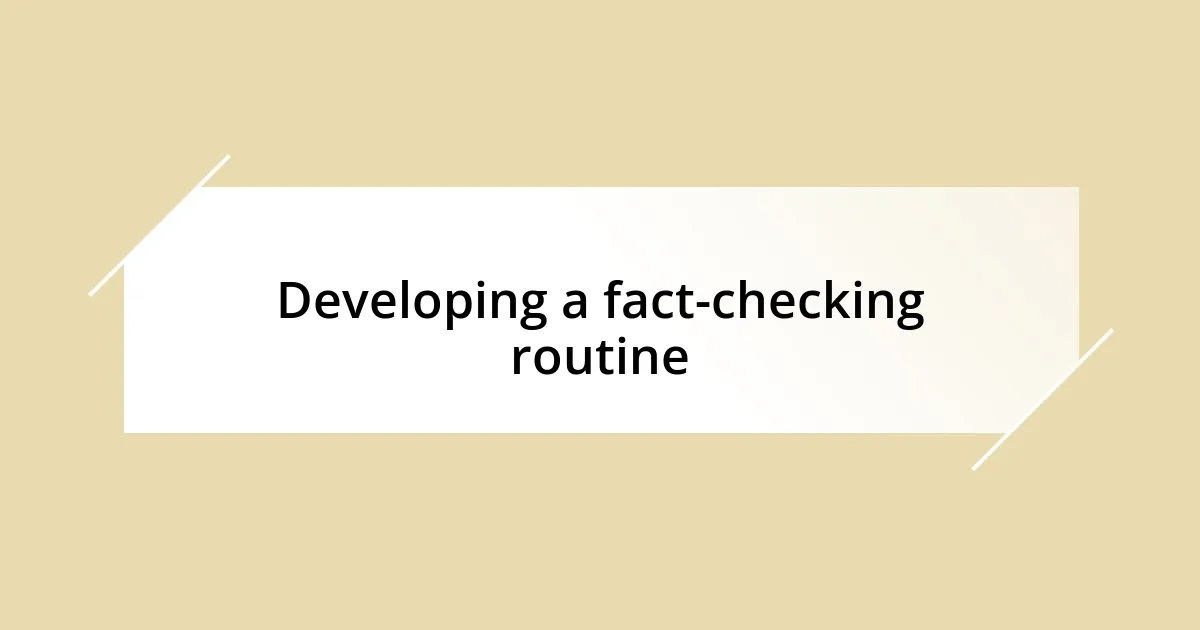
Developing a fact-checking routine
Developing a fact-checking routine is essential for maintaining journalistic integrity. I can’t stress enough how vital it is to have a systematic approach to verify information before it goes to print. In my early days, I remember a piece I published that contained a misleading statistic. In hindsight, it didn’t just misinform my audience—it tarnished my credibility. Since then, I’ve made fact-checking a non-negotiable part of my writing schedule.
To create an effective fact-checking routine, consider these tips:
- Set Clear Protocols: Decide in advance what sources you’ll rely on, whether they’re primary documents, reputable news organizations, or expert interviews.
- Cross-Reference Information: Always verify facts against multiple trusted sources. It was eye-opening for me to see how one piece of information could vary from outlet to outlet.
- Use Tools: Leverage online fact-checking websites and databases. I often utilize Snopes or FactCheck.org when I come across contentious claims.
- Build a Network: Foster relationships with experts in various fields. I’ve found that having someone to turn to for clarification is invaluable, particularly on complex issues.
- Review and Reflect: After finishing a piece, revisit your facts before submission. This reflective pause has saved me from potential missteps on more than one occasion.
Incorporating these steps into my writing process has not only bolstered my confidence but also reassured my audience that the information they receive is accurate and reliable. It’s a continual learning curve, but I cherish the accountability it fosters within me as a journalist.
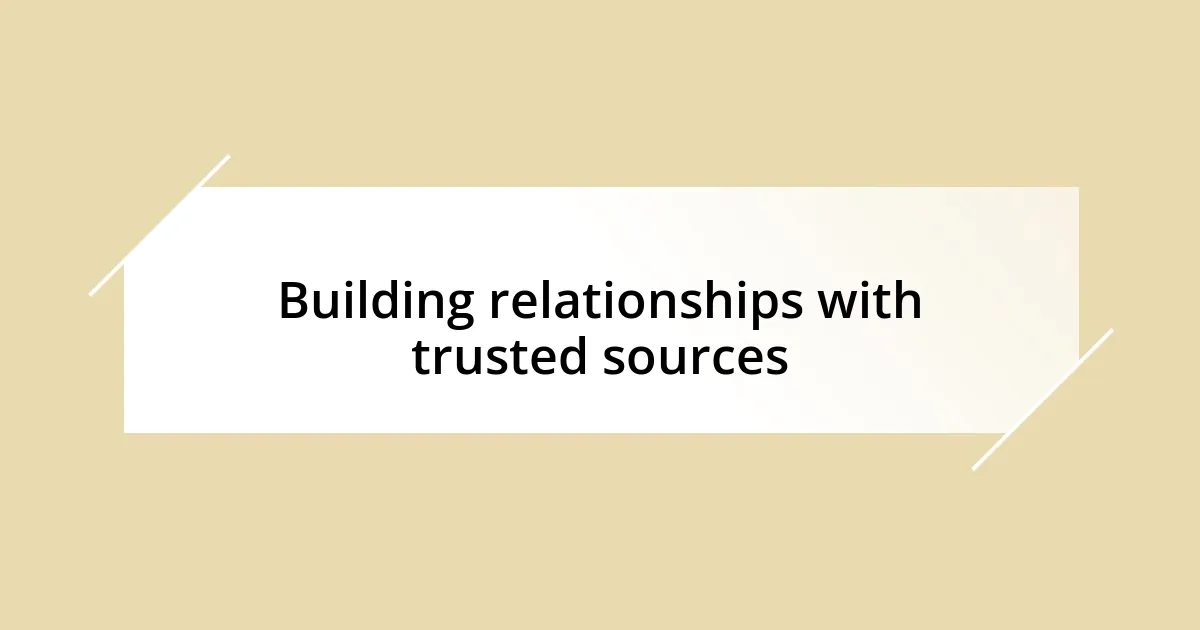
Building relationships with trusted sources
Building relationships with trusted sources is pivotal to my reporting process. For me, every conversation holds the potential for a unique insight that can shape a story. I recall a time when I had an off-the-record chat with a community leader. That casual dialogue led to uncovering nuances about a developing situation that I never would have gained from formal settings. Isn’t it incredible how genuine conversations can unveil layers of understanding?
I prioritize nurturing these relationships because they aren’t just about gathering information; they are about establishing trust. I often reach out to my sources after a story is published to discuss how I portrayed their views. This follow-up ensures they feel respected and helps me refine my approach for future reporting. When I see the relief on their faces, knowing they’ve been accurately represented, it’s a wonderful reminder of why I do what I do.
Moreover, building a strong network of sources means I can access diverse perspectives. It was enlightening when a source invited me to a local event, exposing me to voices I hadn’t considered before. Those connections have enriched my stories, making them more authentic and poignant. I can’t help but wonder: without these relationships, how much would I be missing? Nurturing connections with trusted sources is more than a professional duty; it’s a pathway to deeper storytelling.
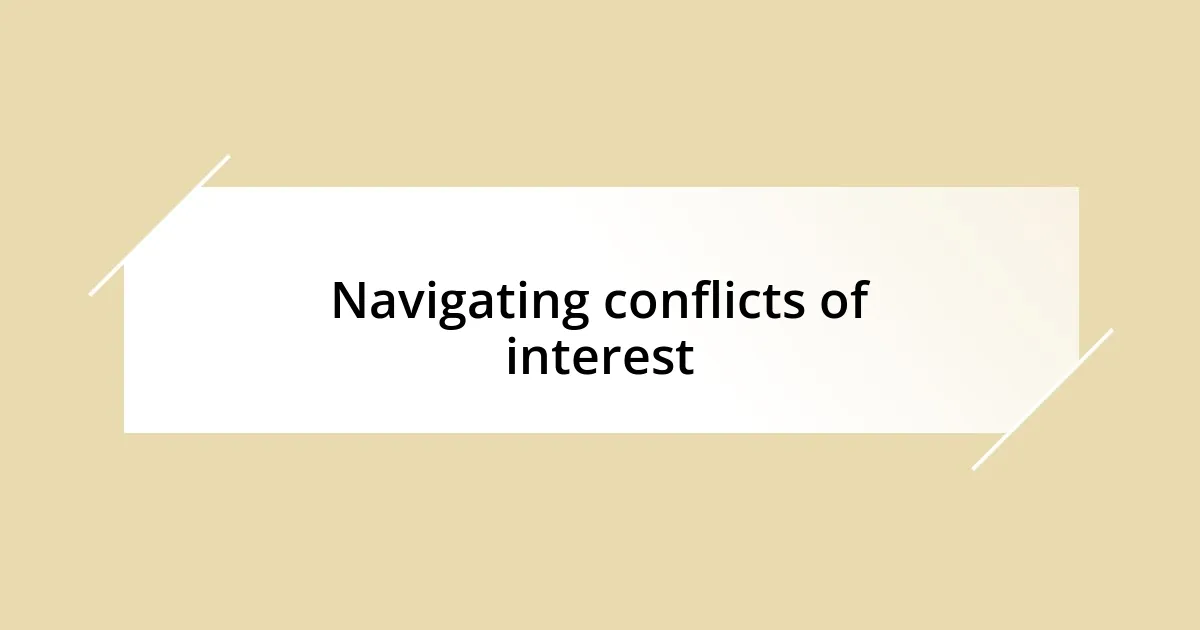
Navigating conflicts of interest
Navigating conflicts of interest is something that requires constant vigilance. I remember a particular incident where I was covering a local business that also happened to be run by a close friend. It took a lot of self-reflection and discussion with my editor to determine how I could cover the story fairly while maintaining our friendship. The process reinforced a vital lesson for me: transparency is crucial. Declaring my relationship at the outset not only eased my conscience but also provided clarity to my audience.
When I face a potential conflict of interest, I ask myself: can my connection influence my reporting? This introspection has steered me away from compromising situations more than once. For example, I once had to decline an opportunity to write a promotional piece for a company I had covered extensively. The decision felt uncomfortable in the moment, but looking back, it was liberating. Upholding my principles allowed me to maintain trust with my readers and ensured I wouldn’t have to grapple with the integrity of my reporting.
I also find it helpful to consult colleagues when navigating these murky waters. Having their perspective can illuminate aspects of a situation that I might not have considered. Just recently, I was unsure whether to pursue a story involving a family member’s political scandal. I shared my dilemma with a trusted mentor who advised me to step back and take a broader look at the implications. That conversation proved invaluable, guiding me toward a responsible route that preserved both my integrity and personal relationships. The takeaway? Keeping the lines of communication open with peers can be a game-changer when grappling with conflicts of interest.
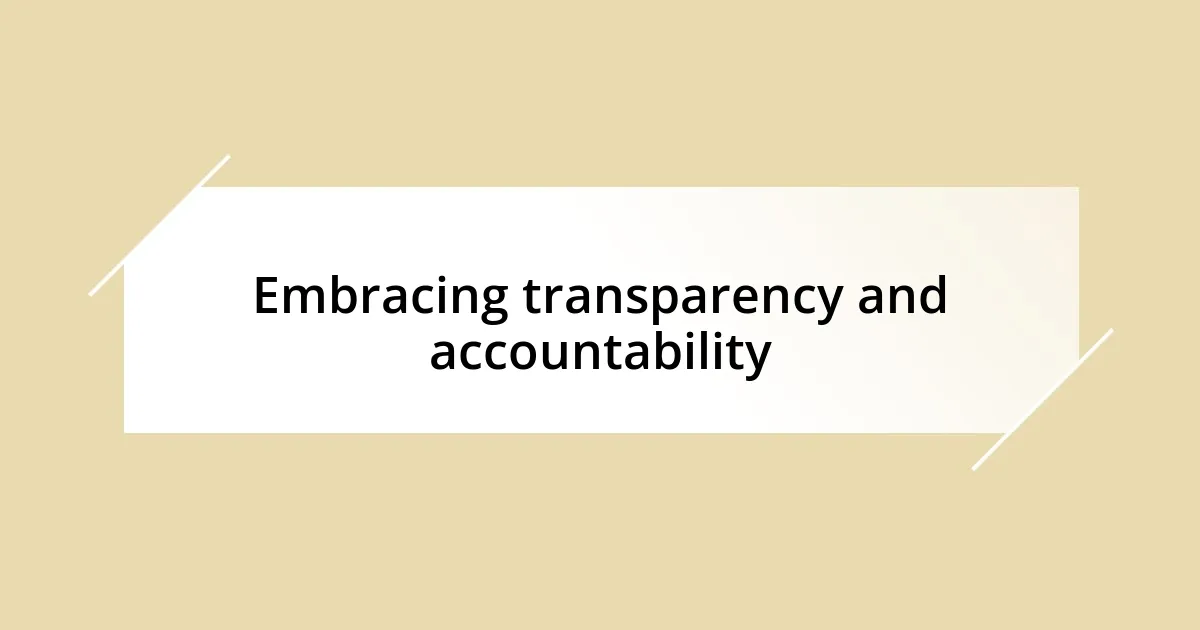
Embracing transparency and accountability
I’ve found that embracing transparency isn’t just a principle; it’s a daily practice that defines my work. For instance, when I recently reported on a controversial policy change, I made it a point to acknowledge potential biases upfront. I shared my prior research connections within the community to create a space for open dialogue. In doing so, I noticed how readers respond positively when they feel they’re part of the conversation. Isn’t it reassuring to know that honesty about our motives can enhance trust?
Accountability also plays a critical role in my journalistic journey. After a piece I wrote sparked discussions on social media, I took it upon myself to engage with both supporters and critics. It wasn’t easy to hear divergent views, yet those interactions were enlightening. They not only challenged my own perspectives but also fostered a sense of shared responsibility for accurate reporting. I often wonder: how can we grow and improve if we aren’t willing to face the feedback, both good and bad?
Sometimes, the most profound lessons come from difficult moments. I once published a story that misrepresented the nuances of a community issue, prompting a flood of negative responses. While it stung to admit my mistake publicly, addressing it head-on felt empowering. I issued a correction and held a follow-up discussion with affected stakeholders, illustrating that true accountability involves acknowledging our errors and learning from them. Have you ever faced a similar challenge, and if so, how did you navigate that journey toward redemption?
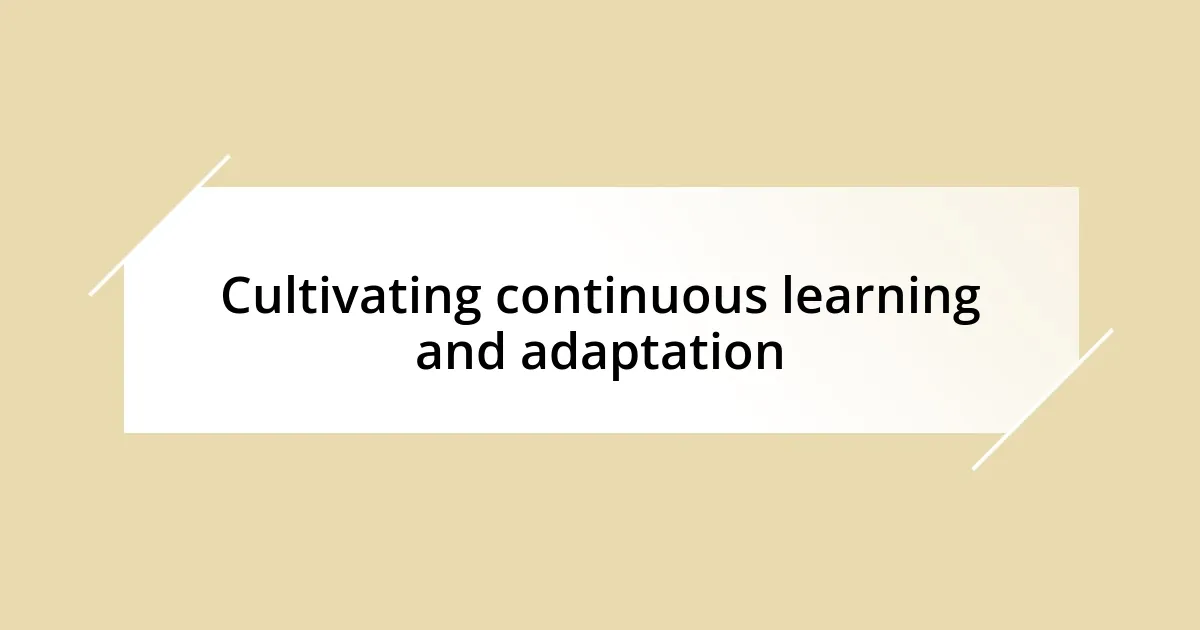
Cultivating continuous learning and adaptation
Cultivating a mindset of continuous learning is essential in journalism, especially in today’s rapidly changing media landscape. I recall attending a workshop on investigative journalism that opened my eyes to new techniques and ethical considerations. The experience reminded me that, no matter how seasoned we are, there’s always something new to learn. As I sat listening to industry experts sharing their insights, I felt a mix of excitement and humility—recognizing that even the most established journalists evolve.
Adapting to feedback is another critical aspect of this journey. There’s a particular instance I remember when a colleague challenged my approach to covering a complex social issue. Instead of brushing it off, I took a step back and reflected on their perspective. It was a tough pill to swallow, but embracing that discomfort led to a more nuanced story and, ultimately, growth in my reporting style. How often do we shy away from constructive criticism? I believe leaning into those tough conversations can ignite our development.
Moreover, engaging with diverse sources and perspectives can fuel our adaptability. I make it a point to read widely—from academic journals to social media debates—so I can understand different viewpoints. There was a time when I felt underprepared to tackle climate change coverage, but immersing myself in various resources transformed my approach. Each article and discussion added another layer to my understanding. Isn’t it fascinating how a single topic can change when seen through multiple lenses? By continuously adapting and learning, I feel better equipped to contribute meaningfully to the discussions that matter.
